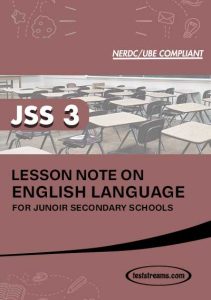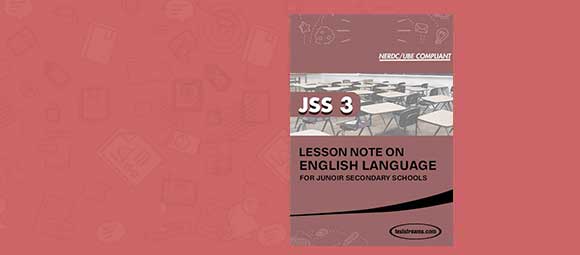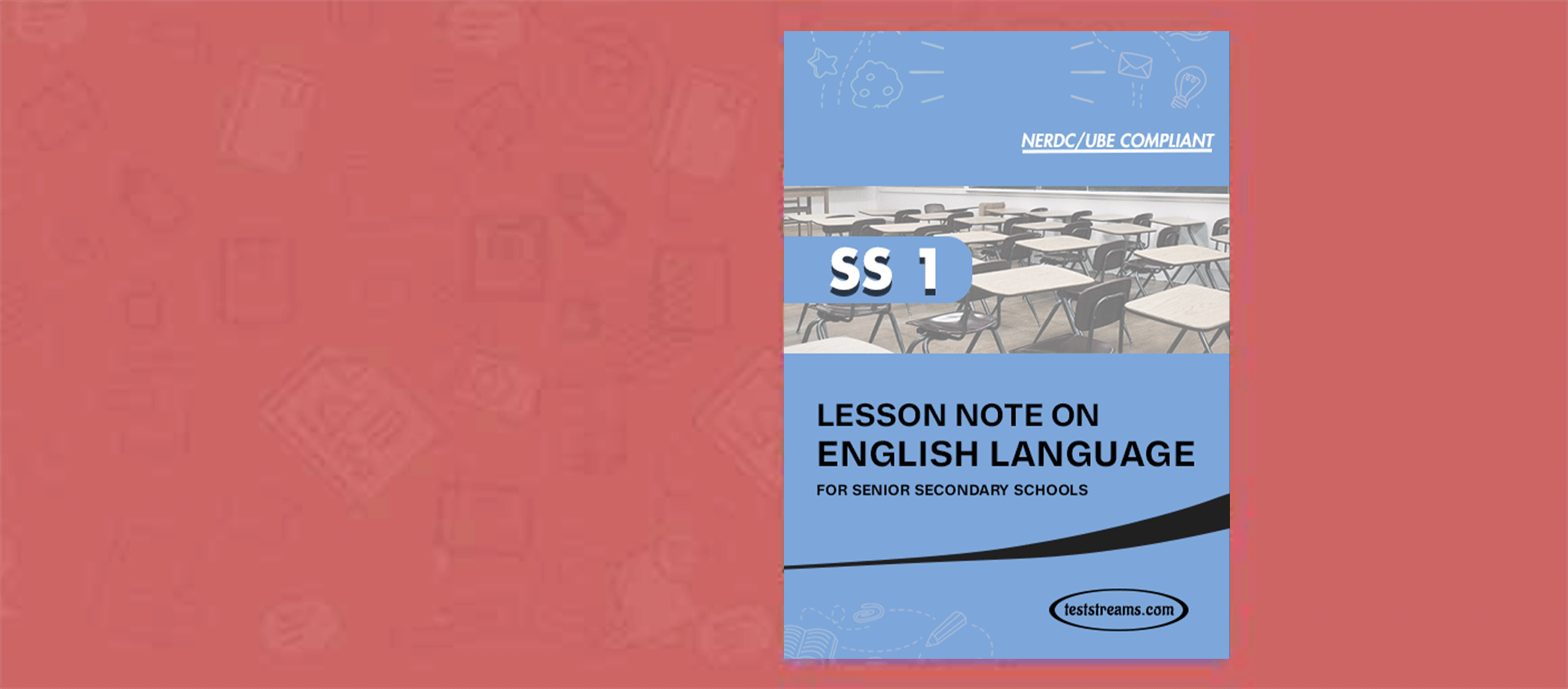Free ENGLISH Lesson Note JSS 3
This ENGLISH Lesson Note was pulled from our book (Lesson Note on ENGLISH for JSS3 MS-WORD); Compiled to serve as a reference material to help teachers draw out their lesson plan easier, saving you valuable time to focus on the core job of teaching.
The Lesson notes are based on the current NERDC curriculum (UBE compliant)
This ENGLISH Lesson Notes Covers The Following Topic
1. GRAMMAR – PARTS OF SPEECH REVISION
2. SPEECH WORK – CENTRAL VOWEL /Ə/
3. SPEECH WORK – INTONATION
4. CONSONANTS /Ӡ/ AND /DӠ/
5. SPEECH WORK: CONTRAST CONSONANTS
6. GRAMMAR – ADJECTIVES AND ADVERBS USING MODAL VERBS
7. SPEECH WORK: /S/, /∫/ AND /T∫/
8. CONSONANT CONTRAST
9. GRAMMAR: ADVERBS OF CAUSE AND REASON
10. CONSONANTS /T/ AND /Θ/
11. CONSONANT CONTRASTS /T/, /D AND /K/
12. CONSONANT CLUSTERS
13. VOWEL SOUNDS
14. NASAL SOUNDS
15. PRONOUNS
16. SYNONYMS AND ANTONYMS
17. LETTER WRITING
18. LITERATURE: FEATURES OF A PLAY
19. REVISION OF NOUNS AND PRONOUNS
20. VERBS AND ADVERBS
21. ADJECTIVES AND PREPOSITIONS
Sample note
Contents:
Speech Work – Central Vowel /Ə/
Grammar (Verb + Prepositions)
Reading and Comprehension – Skimming for Specific Information
Literature – Prose
- Speech Work – Central Vowel /Ə/
This short sound is very common in English. It only occurs in unstressed syllables. It is the vowel you normally hear in these common words: a, an, the, and, but, of. When you have to make this sound, your mouth should not be wide open. Read the following words and phrases aloud. The unstressed syllables are shown in italics, and all contain /Ə/:
again about alone away
teacher mother tailor neighbour
an egg the book a glass of water
at school at home poor but happy
Note that when the comes before another word beginning with a vowel, the sound is no longer /Ə/ but /i/. Say the following:
He mixed the eggs together and poured them into the oil
- Grammar (Verb + Prepositions)
Describing Emotions
Some verbs are not words of action: they express a state of being. Examples include be, become and feel. Often these verbs are followed by an adjective. In these examples, this pattern is used to talk about emotions.
| Subject | Verb | Adjective |
|
Sonkowa |
Was | Happy |
| Became | Unhappy | |
| Felt | sad |
Often, a preposition and an object follow the adjective, as in the examples which follow:
| Subject | Verb | Adjective | Preposition | Object |
| Sonkowa | Was | Happy | With | Adamu |
| They | Felt | Shocked | At | Her response |
Different adjectives are followed by different prepositions. Here is a list of common examples:
| Adjectives | Prepositions |
| Alarmed, embarrassed | At |
| Happy, pleased | With, by |
| Resentful, certain | Of |
| Worried, anxious | about |
Assessment
Complete these sentences below about the story
- Sonkowa was worried …………. her father’s plan
- Sonkowa’s father was pleased ______ the ruler’s reply
- Adamu was alarmed ________ the bird’s words
- Sonkowa’s father became resentful ______ of his daughter’s attitude
- Sonkowa was embarrassed ___the ruler’s attention
- Adamu felt certain ____ Sonkowa’s love for him
- His father became anxious ____ his daughter’s welfare
- We were pleased _____ the story
Describing Emotions
Sometimes an adjective maybe followed by to and the infinitive:
I was sorry to hear your news
I’m pleased to meet you
Adjectives like those above can also be followed by a clause beginning with that:
I’m very pleased that you came
Adamu was anxious that they should leave quickly
- Reading and Comprehension – Skimming for Specific Information
Read paragraph A below and answer the following questions
- Each paragraph is about one topic
- Each paragraph usually contains a topic sentence
A. The Locust is a species of grasshopper.
Locusts are found in all continents of the world except Antartica.
In Africa, there are ten species of locusts.
They are very common in tropical areas , except where it is wet.
B.Locusts live in two form, or phases as they are called:
the solitary phase and the gregarious phase.
In the solitary phase, they live alone like any other grasshopper,
and cause little damage.
But if their numbers increase, they enter the gregarious phase.
In this phase, they can become swarms big enough to darken the sky,
and they are very dangerous
- The topic is
Grasshopper
b. Locusts
c. African Locusts - Which is the topic sentence?
Literature – Prose
Prose is a form of language that exhibits a grammatical structure and a natural flow of speech rather than a rhythmic structure (as in traditional poetry). While there are critical debates on the construction of prose, its simplicity and loosely defined structure have led to its adoption for use in the majority of spoken dialogue, factual discourse and both topical and fictional writing. It is commonly used, for example, in literature, newspapers, magazines, encyclopedias, broadcasting, film, history, philosophy, law and other forms of communication. Prose is a communicative style that sounds natural and uses grammatical structure. Prose is the opposite of verse, or poetry, which employs a rhythmic structure that does not mimic ordinary speech.
Prose is a form of language that has no formal metrical structure. It applies a natural flow of speech, and ordinary grammatical structure rather than rhythmic structure, such as in the case of traditional poetry. Normal every day speech is spoken in prose and most people think and write in prose form. Prose comprises of full grammatical sentences which consist of paragraphs and forgoes aesthetic appeal in favor of clear, straightforward language.
Example of a Prose verse:
Read this from “Stopping by Woods on a Snowy Evening” written by Robert Frost.
“The woods are lovely, dark and deep.
But I have promises to keep,
And miles to go before I sleep,
And miles to go before I sleep.
Common Examples of Prose
Everything that is not poetry is prose. Therefore, every utterance or written word that is not in the form of verse is an example of prose. Here are some different formats that prose comes in:
- Casual dialogue: “Hi, how are you?” “I’m fine, how are you?” “Fine, thanks.”
- Oration: I have a dream that my four little children will one day live in a nation where they will not be judged by the color of their skin but by the content of their character. –Martin Luther King, Jr.
- Dictionary definition: Prose (n)—theordinary form of spoken or written language, without metrical structure, as distinguished from poetry or
- Philosophical texts:Whoever fights monsters should see to it that in the process he does not become a monster. And if you gaze long enough into an abyss, the abyss will gaze back into you. –Friedrich Nietzsche
- Journalism:State and local officials were heavily criticized for their response to the January 2014 storm that created a traffic nightmare and left some motorists stranded for 18 hours or more.
Characteristics of Prose
- Written in paragraphs
- Tells a story rather than describes an image or metaphor
- Generally has characters and a plot
Some Common Types of Prose
- Nonfictional Prose:A literary work that is mainly based on fact although it may contain fictional elements in certain cases. Examples are biographies and essays.
- Fictional Prose:A literary work that is wholly or partly imagined or theoretical. Examples are novels.
- Heroic Prose:A literary work that may be written down or recited and employs many of the formulaic expressions found in oral tradition. Examples are legends and tales.
- Prose Poetry:A literary work which exhibits poetic quality using emotional effects and heightened imagery but are written in prose instead of verse.
Assessment
- Why are paragraphs inevitable in when writing?
- Here are two more paragraphs about locusts. One is well written and the other is not. Read paragraphs A and B and answer the following questions-A. Locusts live in two forms or phases, as they are called: the solitary phase and the gregarious phase. In the solitary phase, they live alone like any other grasshopper, and cause little damage. But if their numbers increase, they enter the gregarious phase. In this phase, they can become swarms big enough to darken the sky, and then they are very dangerous.B. In a few hours a swarm of locusts can eat all the vegetation in an area. A swarm of locusts can cause terrible damage. For example, 10,000 million locusts can eat 20,000 tonnes of food in a day. So in one day, they can eat enough maize to feed 100,000 people for a year.1. Identifythe topic sentence of the paragraphs A & B.2. Which of the two paragraphs is well written? Why?
- Rewrite the badly written paragraph.
- What is a prose?
- Mention and discuss the characteristics of a prose.
- Discuss the four types of prose that you know.

Get the complete Lesson Note with more content at very affordable price. Lesson Note on ENGLISH for JSS3 MS-WORD- PDF
![]()




